- Home
- Bill Bryson
The Road to Little Dribbling Page 9
The Road to Little Dribbling Read online
Page 9
That was all you had to do with Arthur – just speak to him firmly. Meekly, he returned the book to its shelf and wordlessly left the shop.
The young woman looked at me with simple, heartfelt amazement. ‘Thank you,’ she breathed.
I gave her a winning but bashful smile as I had seen Gary Cooper do in the movies. ‘Glad to be of help,’ I said. If I’d had a cowboy hat I would have touched the brim.
The door opened and Arthur put his head in. ‘Will I be allowed pudding tonight?’ he asked anxiously.
‘I haven’t decided yet,’ I said, my tone curt once more. ‘We’ll have to see how you behave.’
Arthur made to depart again, but I called him back.
‘And, Arthur, you must never trouble this young lady again,’ I added. ‘Do you understand?’
He muttered some pathetic acknowledgement and slunk off. I gave the woman another Gary Cooper smile. She was now regarding me with a look of frankest adoration. It’s funny, but sometimes life throws these moments at you that have the capacity to change everything in an instant. In other circumstances, who knows where this encounter might have led? Unfortunately she was only about four feet tall and nearly spherical, so I simply shook her hand and wished her a good day.
Virginia Water has always been an outpost of great wealth, with private roads lined with giant houses curling around the exclusive Wentworth golf course. But on the fringes of the village are some neighbourhoods of more modest homes, and it was in one of these, a pre-war brick semi, that my wife and I passed half a dozen happy years when my children were small and I was a young journalist on The Times. The area in which we lived was called Trumps Green, and I was very pleased, when I strode up there now, to find that it hadn’t changed much. Our old road had lots more cars on it than formerly but otherwise was much the same. Around the corner from our house was a parade of shops that provided for more or less all our daily needs – a butcher’s, a post office and newsagent, a small grocer’s and the world’s most astonishingly well-stocked hardware store, presided over by a kindly man named Mr Morley.
I loved Mr Morley’s shop. You were never disappointed there. Whatever was on your shopping list – linseed oil, two-inch masonry nails, coal scuttle, small can of Brasso – Mr Morley had it. I am sure if you said to him, ‘I need 125 yards of razor wire, a ship’s anchor and a dominatrix outfit in a size eight,’ he would find them for you after rooting around for a few minutes among bird feeders and bags of bonemeal.
Mr Morley was always cheerful and upbeat. Business was always ‘not bad, could be worse’. Mr Morley seemed to me the last bastion of a vanishing world. So I can’t tell you how pleased I was to see the shop sign Morley Hardware still in place and the windows still crowded with tools and useful items. When civilization finally collapses, when the dead rise up and walk again and the North Sea floods British shores, Mr Morley will still be there, selling mothballs, flyswatters, seed packets and galvanized wheelbarrows. As Britain sinks beneath the waves, it will be Mr Morley, standing on the tallest of his many stepladders, who will be the last to go.
I pushed through the door, eager to see him. Mr Morley always remembers me. I expect he remembers all his old customers. To my surprise there was another man behind the counter. I had never not seen Mr Morley in there. I swear if you’d gone to the shop at midnight, you’d have found Mr Morley standing at the counter in the dark, just waiting for it to be time to open.
‘Is Mr Morley on holiday?’ I said.
‘Oh, he’s gone,’ said the man in a quiet, grave tone.
‘Gone?’
‘Dead, I’m afraid. Massive heart attack. About four years ago.’
I was temporarily speechless. ‘Poor man,’ I said at last, but I was really thinking of myself. Mr Morley and I were about the same age. ‘What a shame.’
‘Yes.’
‘What a terrible thing. Poor man.’
‘Yes.’
I couldn’t think of another thing to say. It occurred to me that I didn’t have the faintest idea of whether Mr Morley had a family or where he lived or anything at all about him. But then how would I ever have found out such a thing? ‘Good afternoon, Mr Morley. Could I have a bag of mothballs and are you in a happy, stable relationship, heterosexual or otherwise?’ He had no existence that I knew of outside his shop. So I just said thank you and in sombre mood departed.
I strolled back into the village proper, to the boundary of the old sanatorium, now an elegant gated compound called Virginia Park. The sanatorium closed in 1980 and the building was converted into apartments. The grounds, where once there were gardens and a cricket pitch, are now filled solid with executive homes. For £895,000, according to a glossy brochure, you can buy a ‘magnificent townhouse in this Grade I-listed restored mansion’. Well, let’s be quite clear about this. It is not a restored mansion at all. It was a building full of gloriously demented people, some of them from Britain’s finest families. Where you lay your head tonight could very well be where Lady Boynton routinely peed in the corner.
But what a wonderful retreat it was in its day. People have never had a more beautiful place to be lost and addled. Of William Henry Crossland’s two great creations for Thomas Holloway, the sanatorium is to my mind much the finer. It, too, has an enormous frontage, but it is broken up with a great central tower and gables that make it more interesting and less forbidding. I remember one June evening when I was new there looking out of a window from high up in the building on to the grounds and thinking it was the finest view I had ever seen. A cricket match between the Holloway staff and the staff of some other hospital was moving towards a stately conclusion below me. Long, end-of-day shadows lay across the lawn. The gardening detail – a ragtag army of patients lethally but trustingly armed with scythes and hoes and shears – was marching in broken ranks back from the vegetable garden. Britain in that moment really seemed a perfect place.
It’s all long gone now, I’m afraid. When the sanatorium shut, the patients were moved to a new unit within a general hospital at Chertsey. In the beginning they were allowed to roam freely, as they always had, but that had to be brought to an end because the patients, robbed of all that was familiar, wandered into places they shouldn’t go and disturbed people in the waiting areas by asking them for fags or calling them pustulant whores or any number of other things that weren’t compatible with an efficient, modern general hospital. So they had to be locked away, and in no time at all most of them had sunk into a permanent torpor from which none of them ever stirred and no one had time to rouse them.
But it was great while it lasted. Looking back now, I really do think Britain had attained something approaching perfection just around the time of my arrival. It’s a funny thing because Britain was in a terrible state in those days. It limped from crisis to crisis. It was known as the Sick Man of Europe. It was in every way poorer than now. Yet there were flowerbeds on roundabouts, libraries and post offices in every village, cottage hospitals in abundance, council housing for all who needed it. It was a country so comfortable and enlightened that hospitals maintained cricket pitches for their staff and mental patients lived in Victorian palaces. If we could afford it then, why not now? Someone needs to explain to me how it is that the richer Britain gets the poorer it thinks itself.
All of the long-term patients at Holloway were quite mad – that is why they were long-term mental patients, after all – but sufficiently institutionalized on the whole that they could go to the village each day to buy sweets or a newspaper or have a cup of tea in the Tudor Rose. To any outsider it must have seemed extraordinary, a village filled with normal citizens going about their daily business, but also liberally scattered with people who were clearly not right in the head, who conversed in an animated fashion with empty space or stood at the back of the village bakery with their nose pressed to the wall. You can’t have a more civilized community than one in which hospital staff play cricket at the end of a summer’s day and lunatics can wander and mingle without excit
ing comment or alarm. It was unsurpassably wonderful. It really was.
That was the Britain I came to. I wish it could be that place again.
Chapter 7
Into the Forest
I
ONCE OR TWICE a year I go walking with my old friends Daniel Wiles and Andrew Orme, and sometimes we are joined by another friend from California, John Flinn, as we were this year. We have walked Offa’s Dyke and the Ridgeway, traipsed through the Peak District and Yorkshire Dales, followed the Thames from source to sea (actually to Woolwich), clambered to the tops of Dorset’s highest hills, and met many other challenges and adventures. Once we were chased from a Thames path by a very angry swan – you’d have fled, too, believe me – but otherwise our adventures have been pretty largely marked by hardiness, fortitude and courage in the face of cows, with just tiny amounts of bitching here and there.
This year for various reasons we could only get together for three days, so we decided to meet at a hotel in Lyndhurst, in the heart of the New Forest, which pleased me very much. I lived for two years on the edge of the New Forest near Christchurch when I worked in Bournemouth, and have spent many a happy Saturday tramping around there. It’s a lovely area. If you are from another country, you may need to be told that the New Forest isn’t in fact new and not even altogether a forest. It hasn’t been new since the time of the Norman Conquest and, though much of it is wooded, a great deal of it is open heathland and nothing like a forest as we normally think of it. ‘Forest’ originally signified any area set aside for hunting. It could be wooded but didn’t have to be. Nearly all of Britain’s once-great forests – Sherwood Forest, Charnwood, Shakespeare’s Forest of Arden – have gone altogether or are much reduced. Only the New Forest retains something of its ancient dimensions.
Throughout much of its history, the New Forest has been famous for its wild ponies, which graze wherever they like and wander picturesquely through the villages. Nowadays it is also celebrated for its traffic at Lyndhurst, the unofficial capital of the forest. People come from all over Britain to experience Lyndhurst’s famous traffic jams, often without intending to. Perhaps no other town in Britain has been more comprehensively overwhelmed by the motor car over a longer period with less imaginative attempts at amelioration. On a typical summer’s day, some fourteen thousand vehicles are funnelled through a constricted T-junction on Lyndhurst’s High Street, governed by a single set of traffic lights.
Unfortunately, out of all the people in the world to whom the authorities might have turned to solve the problem, they chose highway engineers. In my experience, the last people you want trying to solve any problem, but especially those involving roads, are highway engineers. They operate from the principle that while no traffic problem can ever truly be solved, it can be spread over a much larger area. At Lyndhurst some years ago they introduced an astoundingly circuitous one-way system, which appears to have been designed to take vehicles through as many formerly peaceful residential districts as could be packed into a single visit. The system ensures that anyone getting in the wrong lane, which is almost inevitable for newcomers, will have to go round twice more – once to discover that, oops, we’re still in the wrong lane, and once to get into the right one. It has occurred to me that Lyndhurst may not receive fourteen thousand different vehicles a day, but just a couple of thousand going round and round again.
It used to be that people who knew the area would turn off on to back roads before reaching Lyndhurst and detour around the town altogether, thus arriving at their destination sooner and helpfully removing themselves from the town’s congestion. That is what I tried to do now. At a place called Pikes Hill, I shot down a side lane towards Emery Down, but discovered at once that the highway engineers, cunning souls, had narrowed the back roads to a single lane with occasional passing places to discourage freelance orienteering, with the result that traffic jams back there were as bad as any in Lyndhurst. I am serious when I say that this is how these halfwits operate – by endeavouring to make everywhere as bad as the part that caused the original problem. It took me an hour and a quarter to get the last mile and a half to my hotel on the High Street.
My hiking companions were similarly inconvenienced in different places. By the time we managed to rendezvous it was nearly one o’clock and we were to a man famished, so our first piece of business was to find a place to eat. On the edge of Lyndhurst is a famous beauty spot called Swan Green, where a clutch of thatched cottages overlook the aforesaid green. It is a view that has featured on many a box of fudge. Opposite is the Swan Inn, to which we now repaired, happy to be in each other’s company and looking forward to something to eat after our drives. We studied the bill of fare keenly, then presented ourselves at the bar to place our order.
‘Oh, we’re not taking food orders just now,’ the young barman told us. ‘There’s been a run on the kitchen,’ he added by way of explanation.
We looked around. It wasn’t that busy.
‘How long will it be?’ we asked.
He considered the tranquil scene before him. ‘Hard to say. Three quarters of an hour maybe.’
This was all the more confusing because the Swan Inn is one of those pubs that would like you to regard it as a restaurant, with chalkboards of specials all over the place and menus and cutlery on the tables.
‘Can I just check I have got this right?’ I asked. ‘On a Sunday afternoon at the height of the tourist season, a number of people have turned up here wanting lunch, and this has taken you by surprise?’
‘Well, we’re short of staff because it’s Sunday.’
‘But isn’t Sunday one of your busiest days?’
He nodded emphatically. ‘I’ll say.’
‘Yet it is everyone’s day off?’
‘Well, it’s Sunday, you see,’ he said again as if I hadn’t quite got it the first time.
Andrew was already leading me gently away by the elbow. He must have seen my wife do it at some point. We walked back into Lyndhurst and found a café that was able to serve us lunch without throwing the kitchen into a panic, and afterwards, feeling much refreshed, we went for a good healthy tramp through dark woods and sunny heath.
What a joy walking is. All the cares of life, all the hopeless, inept fuckwits that God has strewn along the Bill Bryson Highway of Life suddenly seem far away and harmless, and the world becomes tranquil and welcoming and good. And to walk with old friends multiplies the pleasure a hundredfold. Lyndhurst was heaving with people, particularly around a beauty spot on the edge of town called Bolton’s Bench, which has a famous yew tree but, more particularly, a nearby car park. I read once that the furthest distance the average American will walk without getting into a car is six hundred feet, and I fear the modern British have become much the same, except that on the way back to the car the British will drop some rubbish and get a tattoo.
But as soon as we headed into the wooded enclosures beyond Bolton’s Bench, we had the forest largely to ourselves, and what a treat it was. It was a perfect day for a walk. The sun was shining, the air was warm. We saw many grazing wild ponies. Wildflowers filled the sunny glades and nodded at the pathside. Andrew, our natural history expert, recited their names for us – ladies’ bedsore, yellow cowpox, tickle-me-knickers, sneezle, old man’s crack. I didn’t have my notebook with me, so I may not have all the names exactly right, but that was the drift of it.
Allow me to introduce my companions:
Daniel Wiles is a retired maker of television documentaries. I met him twenty years ago when we made a South Bank Show together and we have been friends ever since. He likes naps and an ice cream in the afternoon.
Andrew Orme is an old friend of Daniel’s – indeed a very old friend, for they met at a boarding school when they were small, pale, skinny, frightened boys. They talk about those days a lot. Andrew is by far the smartest of us – he went to Oxford University, as we always boast proudly to landladies – so we let him carry the map and make all the important decisions.
&n
bsp; John Flinn was for a long time the travel editor of the San Francisco Chronicle, but he is now retired. He does a lot of travel writing still, and passes through England from time to time and is thus able to join us pretty regularly. He loves baseball and shares with me an abiding admiration for the model Cheryl Tiegs as she was forty years ago and, in our memories, will always be.
We tend not to see each other in between our semi-annual walks, and so always have a lot of catching up to do. Daniel and Andrew walked along chattering about public school things – flagellation and steamed puddings, I suppose. They can go on for hours like that when they first get together. John and I talked about baseball and American politics. Because he is from California, John always has good stories about people doing strange things. This time he told me about how a person not far from his home had recently been Tasered, almost fatally, by a park warden for not having his dog on a leash.
‘He was Tasered for not having his dog on a leash?’ I asked. California stories always take a little getting your head around.
‘Not intentionally exactly. The warden was trying to stop him from leaving the scene and Tasered him, and he had a heart condition and nearly died.’
‘Do the authorities often Taser people in your public parks?’
‘There’s a campaign to keep dogs on a leash. They’re having a crackdown.’
‘An armed crackdown?’
‘Well, they don’t usually Taser people. It’s just that the warden asked him to wait while she checked his identity—’
‘Park wardens can do background checks?’
‘Apparently. But for some reason it took a while and the man got tired of waiting and said to her, “Look, either cite me or let me go.” But she wouldn’t do either, so eventually, after several minutes more, he said, “This is a waste of my time and I’ve got things to do and I don’t think you actually have the authority to detain me because you are just a park warden, so I am going now.” And he started to leave.’

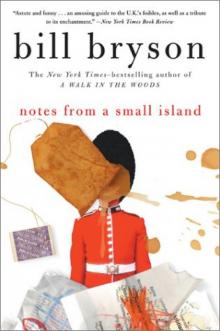 Notes from a Small Island
Notes from a Small Island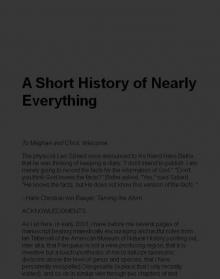 A Short History of Nearly Everything
A Short History of Nearly Everything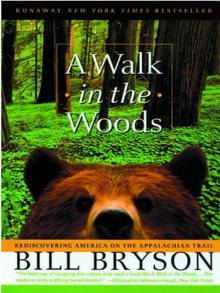 A Walk in the Woods
A Walk in the Woods I'm a Stranger Here Myself
I'm a Stranger Here Myself The Mother Tongue
The Mother Tongue Shakespeare
Shakespeare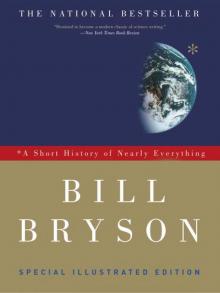 A Short History of Nearly Everything: Special Illustrated Edition
A Short History of Nearly Everything: Special Illustrated Edition The Best American Travel Writing 2016
The Best American Travel Writing 2016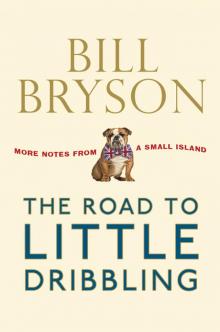 The Road to Little Dribbling
The Road to Little Dribbling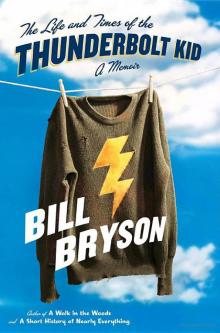 The Life And Times Of The Thunderbolt Kid: A Memoir (v5.0)
The Life And Times Of The Thunderbolt Kid: A Memoir (v5.0) Made In America
Made In America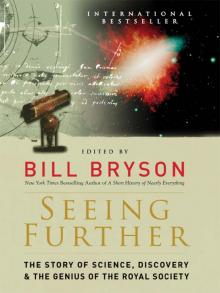 Seeing Further
Seeing Further Shakespeare: The World as Stage
Shakespeare: The World as Stage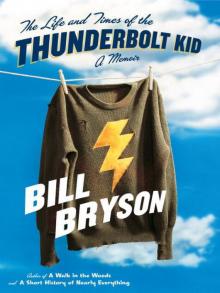 The Life and Times of the Thunderbolt Kid
The Life and Times of the Thunderbolt Kid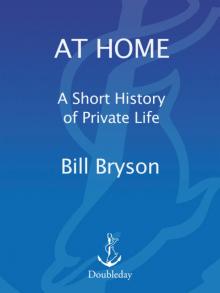 At Home
At Home Bryson's Dictionary For Writers And Editors (v5.0)
Bryson's Dictionary For Writers And Editors (v5.0) Neither Here Nor There
Neither Here Nor There Bill Bryson's African Diary
Bill Bryson's African Diary